Regular visitors to this site will remember that the last time we were in the company of Stephen Decatur was last summer when we marked the anniversary of his defeating the Barbary pirates. At the time, we left him jauntily sailing west on a bright day, skimming over a bracing sea after facing Algerine frigates menacing Decatur’s lone American ship, until they thought better of it.
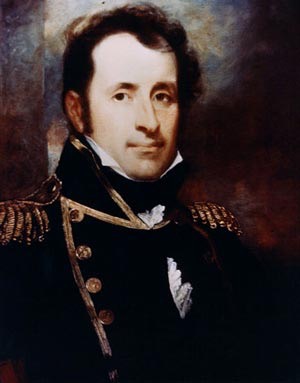
Stephen Decatur Jr.
That was in the fall of 1815, and his story only got better when he arrived in New York City. He was the toast of that town and his country’s most celebrated naval hero. Commodore Stephen Decatur had everything: public adoration and the plaudits of politicians, men who disagreed about everything except Decatur’s greatness. Common seamen who served under him told tales in taverns of his audacity and daring exploits, of impossible triumphs against long odds. They ended with raised tankards all ‘round.
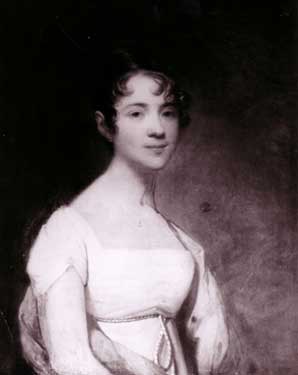
Susan Wheeler Decatur in 1803
Decatur came home to that and more. The navy placed him on its 3-man board of commissioners — the men who helped set policy and counseled on coastal defense, new ship construction, and promotion lists. It meant he would be away from the sea for the longest period since his midshipmen days almost 20 years before, but it also meant he would live in the capital with Susan, his wife of ten years but still a sylph who played spritely tunes on a harp and had eyes that made men think of spring. A woman like that could make a man willing to trade the bluest sky and deepest water for a hearth fire and a smile.
Today we mark another anniversary for Stephen Decatur, a mournful one in the actual sense. Less than five years after his triumphant return from the Second Barbary War, the nation’s capital buried Stephen Decatur. It was on March 24, 1820. His death struck the country to its core. Every important person in Washington attended the ceremony. In solemn procession came President James Monroe, the cabinet, members of Congress, the Supreme Court, Decatur’s colleagues in the navy, 10,000 citizens wearing black crêpe. As Decatur’s coffin was placed in the crypt at Kalorama — the owner counted it a high privilege to have him there — one of the seamen of raised tankards broke the silence with a shout: “The navy has lost its mainmast!”
Decatur had been mortally wounded two days earlier in a little clearing outside Bladensburg, Maryland. Susan Decatur always believed he was assassinated.
It was more complicated than that, of course, because the events that led to Decatur’s killing were a tangle of pride, jealousy, fear, and honor. Amid the glory and daring that defined the U.S. Navy in America’s early days, there were proud men, some flawed by envy over other’s successes, some fearful that past mistakes would never be forgotten or worse, would be revealed. All sought honor. It drove them to events of uncontrolled violence at sea where ships hurled enormous pieces of iron at each other; it compelled them to submit to ritualized violence on land, where men dueled over trespasses both imagined and real, sometimes to the death. The events leading to Decatur’s death included all of these elements, and because their confluence was as complex as tragic, Susan Decatur preferred the simpler explanation: her husband was assassinated.
Decatur had been a navy commissioner for about three years when James Barron ended a lengthy exile in Europe. Barron was seeking reinstatement in the U.S. Navy, which was as important to Decatur to stop as it was for Barron to attain.
That was because both were men of considerable pride with a heightened sense of honor. In fact, the two were much alike in many ways. Their naval careers had followed a similar track, like two imposing ships in van but sometimes pulling abreast of each other. Barron was ten years older than Decatur and, like him, from a family of mariners. Such connections not only eased both of them into the service but also placed them for a time aboard the same ship, the frigate United States. As a superior officer, Barron was fatherly, for Lieutenant Decatur could be brash. When he came close to resigning his commission over a quarrel with the Navy Department, Barron sat him down, smoothed his feathers, and saved the angry young man’s career.
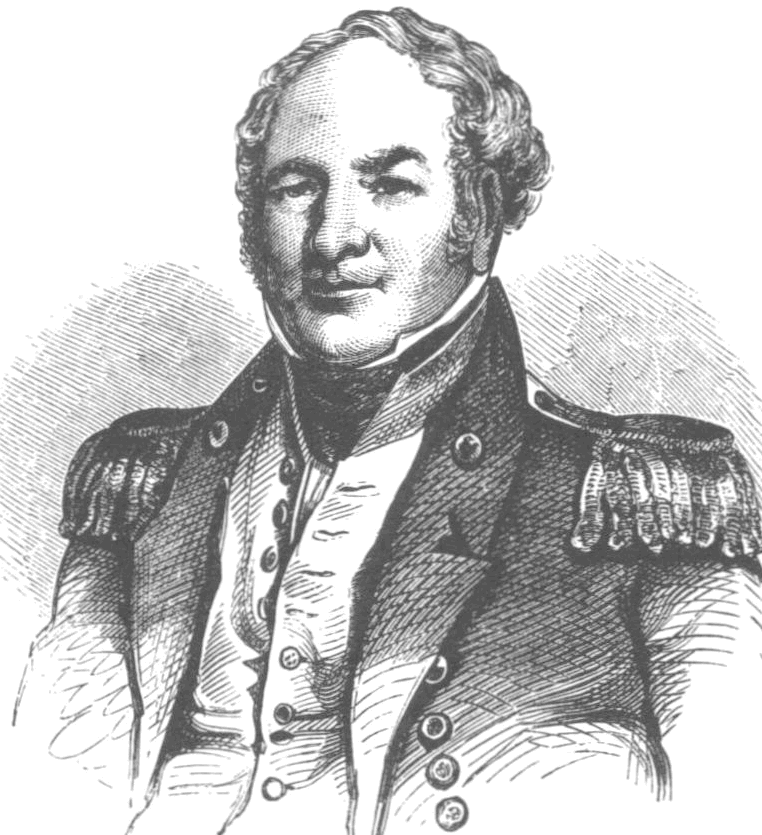
James Barron
They were friends, and for a time, they were close. But Barron was a different sort of person in ways that made Decatur the better officer, if not the better man. Barron was a fastidious disciplinarian and could run a taut ship with reasonable punishments, but Decatur’s men followed orders because they would not disappoint someone they intensely admired. In 1804, when Lieutenant Decatur came up with the harebrained scheme to sail a 4-gun ketch into Tripoli’s harbor under bristling batteries, pull up beside and board the captured Philadelphia at anchor, defeat its enemy crew of some 700 men, and burn her to the waterline, there were men actually disappointed that they could not go with him to certain death. And when he pulled the whole thing off without losing a single man from his tiny crew of 70, those with him would always have their own St. Crispin’s Day. They would hold tankards aloft in taverns and speak about sailors safe abed in hammocks who were forever destined to hold their manhood cheap for not being bound for glory with Decatur that night on the little Intrepid.
Nobody ever held tankards aloft for Barron. In fact, it was as if a rising tide for Decatur required an ebbing one for someone else, and Barron seemed the man fated for the role. The moment that he set foot on the USS Chesapeake in the spring of 1807, he sense something was wrong. As a commodore, he was the ranking office but not actually in navigational command of the ship. That was Master Commandant Charles Gordon. Barron disliked Gordon for his reliance on political connections to snag plums and his courting of crews with lax discipline. In the Chesapeake’s case, the crew was a collection of misfits and green recruits on a ship poorly equipped for a long voyage. As it happened, nobody would have to worry about a lengthy trip.
The British claimed there were deserters from the Royal Navy aboard the Chesapeake, and a British ship stood off the coast ready to reclaim them. As the Chesapeake sailed from Hampton Roads on June 22, 1807, HMS Leopard violently waylaid her with a series of broadsides that damaged her hull and rigging, killed eighteen sailors, and wounded many others, including James Barron. The Chesapeake was able to fire only one shot in response before Barron surrendered. A British boarding party inspected his crew, claimed the “deserters,” and left the American naval vessel to limp back into port.
The Chesapeake-Leopard incident outraged the country, and many were just as angry over the craven behavior of the American crew and its commanders, whose most energetic action when under attack was to lower their flag. Charles Gordon began fighting duels, but James Barron bore the full weight of official disgrace. He was court-martialed for charges ranging from cowardice to negligence, and though cleared of cowardice, he was convicted of unpreparedness and suspended from the navy for five years without pay. Nobody would ever raise a tankard to James Barron.
Stephen Decatur sat on the court that tried Barron, but he didn’t want to. Privately, he expressed his outrage over his old friend’s behavior, and before the trial he revealed to the secretary of the navy his prejudice. He plainly stated that his participation would injure Barron’s chance for an impartial hearing. When the secretary would not let him off, Decatur told Barron’s counsel about his feelings, obviously in the hope that legal protests would lead to his recusal. He was likely shocked when no objection resulted from his disclosures — Robert Taylor, Barron’s lawyer, mistakenly thought his client’s vindication was assured — and Decatur did his duty as he saw it. James Barron could not forgive him.
With five years on his hands and the necessity of making a living, Barron had plenty of time to brood. He entered the merchant service, running cargoes for Norfolk merchants in the Atlantic trade to South America at a salary of $40 a month with a 2.5% commission. It wasn’t bad money, but the Ango-American war in 1812 changed everything. Barron by then was in northern European waters, first at Gothenburg, Sweden, and finally in Copenhagen, Denmark, where his merchant career abruptly ended when the Royal Navy shut down American trade.
His time in Copenhagen became humiliating. He lived in a dismal one-room attic apartment he could barely afford. His only friend was the American consul John Murray Forbes, and his only income was earned by crafting gadgets that he sold to make ends meet. In 1813 his suspension was at end, and he wrote to the secretary of the navy requesting reinstatement. He copied the letter several times and sent it on different ships to raise the odds one would get through, but it didn’t matter for a couple of reasons. It didn’t help his petition that his bitterness boiled up in several paragraphs ranting against the injustice of his court martial and its sentence. It also didn’t help that Barron seemed to make no effort to return the United States and help fight its war.
In fact, troubling stories multiplied about Barron’s behavior in exile. Perhaps one was partly true. Credible witnesses said he told a British diplomat that he would not have fought the Leopard even if the Chesapeake had been prepared because of the deserters in her crew. He was said to have openly criticized Thomas Jefferson as a hypocrite. Barron was sour enough to have some of this ring true. Even more damning was the allegation that during the war he procured a British commercial license and freighted cargoes to British ports. This story was most certainly false, but it and the one about the British diplomat were in circulation by the time Barron finally managed to return to the United States in the spring of 1818.
Even if all stories about his waywardness were groundless, there was no denying that he had sat out the entire War of 1812 while fellow officers were fighting and dying for their country. As a consequence, his was hardly a hero’s welcome. The secretary of the navy rebuffed his application for reinstatement, and his limited support in Congress was tepid. He had come to the end of his rope. He joined his impoverished family in a squalid dwelling in Hampton and tried to find friends in unlikely places. One afternoon on a Norfolk sidewalk, Barron swallowed his pride and with a jovial greeting approached his old enemy John Rodgers, who had presided at his court martial. Rodgers looked through Barron and walked briskly on.
Victimized by rumors, Barron became susceptible to them, and he ultimately fell prey to a wretched man posing as his friend. Captain Jesse Elliott had been the only friendly witness at Barron’s trial a decade earlier, and he now visited Barron with soothing words of support that masked his real purpose, which was to carry a tale. He told Barron that Stephen Decatur was mocking him in public. He told how Decatur used dinner table conversation to defame Barron and attended fashionable soirées around Washington to drop comments about Barron’s dereliction, his absent courage, and his bad character. Barron reached for his pen.
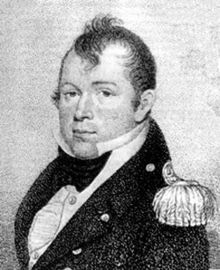
Jesse Duncan Elliott
This much was true: Decatur opposed Barron’s reinstatement because he could not forgive Barron’s absence during the war. He was not alone in saying this officially, and he was not shy about revealing the opinion in private conversations. Even though Decatur was expressing a widely held opinion that he shared with his two colleagues on the Board of Navy Commissioners, Barron had always believed that Decatur was the principal obstacle to reinstatement. Now he had the additional grievance of defamation, and he confronted Decatur with the story.
Decatur replied with the candid admission that he did in fact oppose Barron’s return to the service, but he appealed to Barron’s sense of fairness. “There was not employment for all the officers who had faithfully discharged their duty to their country in the hour of trial,” Decatur explained, and concluded that given Barron’s absence, it would be “an act of injustice” to employ him. Decatur declared there was nothing personal in this position nor was it motivated by enmity, and he said that Barron was misinformed about the tone of Decatur’s private conversations.
This seemed to satisfy James Barron. He even seemed relieved to end the correspondence with gratitude that Decatur did not think ill of him.
From there the real trouble started.
Well, no, said Stephen Decatur, in response to Barron’s second letter. He drafted a clarifying reply that honed the point: what Barron had done, he said, was wrong to the point of being unforgivable. It was a mistake for Decatur to write that letter, but it was in character for him to be open about his feelings. He did not want Barron to think that he was saying things behind his back. But Decatur’s second letter set off a lengthy exchange of letters between them that gradually grew heated. Finally Barron inferred that Decatur was challenging him to a duel. Decatur explicitly denied this. But he was uneasy over the appearance that Barron wanted a fight. Decatur said that if that were so, he would accommodate him.
These exchanges began in the fall of 1819 and took months to unfold. The span of time gives the impression that when James Barron finally issued a challenge to Stephen Decatur, it was not an impetuous act. Yet this is also deceiving. Jesse Elliott’s continued role in the Barron-Decatur argument has never been completely clear, but he seems to have been responsible for keeping it alive. When it flagged and tempers cooled at the end of 1819, it was Elliott who again visited Barron with more tales to tell. When Barron’s challenge came, it was Elliott who acted as Barron’s second.
What was Elliott’s motivation? Since September 1813, Jesse Duncan Elliott had lived under the shadow of the Battle of Lake Erie. He was Oliver Hazard Perry’s second in command at that pivotal event, commanding the Niagara in Perry’s line of battle, but he was strangely inactive during the fight’s first two hours. As Perry’s flagship Lawrence was pulverized by sustained British fire, Elliott held the Niagara back. After Perry’s great victory, there was grumbling about Elliott among fellow officers, and the word “yellow” was even bandied about, but Perry hushed it all up. (He later explained that he didn’t want the British to know that the American navy had a coward in its officer corps.) After the war, however, Perry lodged formal charges against Elliott. The political explosion these portended caused the Navy Department to shelf the matter, but Perry was determined, and Elliott was tarnished.
Oliver Hazard Perry was Stephen Decatur’s closest friend, and Elliott rightly suspected that the two were in perfect agreement about the occurrence at Lake Erie and what should be done to redress it. Just before the Barron-Decatur exchanges were getting underway, Perry was on station in South America where he contracted yellow fever and died. Rather than free Elliott from possible disgrace, Perry’s death made Elliott doubly fearful of Decatur, a member of the powerful navy board. It was shortly after Perry’s death that Elliott renewed his friendship with the friendless James Barron. Susan Decatur came to know all this, and for her the explanation of what followed was simple.
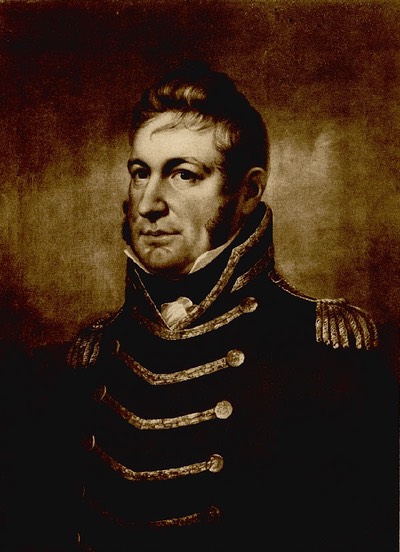
William Bainbridge
But there was more. Decatur reluctantly accepted Barron’s challenge and sought his own second. His first choice was Thomas Macdonough, the hero of the Battle of Plattsburgh, but Macdonough opposed dueling and refused to have any part in one. That required Decatur to ask William Bainbridge to represent him. It turned out to be a fatal mistake. Bainbridge was outwardly friendly toward Decatur but inwardly jealous of him. The envy had a long pedigree. In 1803, Bainbridge had been in command of the Philadelphia when it was taken by the Tripolitans, and he likely was chafed by Decatur’s daring exploit to destroy the captured ship. More recently, Bainbridge had scowled over Decatur’s brilliant Mediterranean campaign in the Second Barbary War, especially because Bainbridge was actually in command of the squadron but again had been shown up by Decatur’s valor.
So a man who disliked Stephen Decatur served as his representative to arrange a duel by meeting with Elliott, Barron’s second, a man afraid of Stephen Decatur. The terms that resulted were extraordinary: pistols at eight paces. The distance was to be marked off ahead of time to place the antagonists facing each other. They were to fire during (not after) a count of three.
This was highly irregular. Eight paces would place them within 25 feet of each other. That short distance assured that somebody was going to get hurt, and likely killed, if that was the object of either man, crack shot or not. Yet Elliott claimed Barron’s bad eyesight required the short distance, and Bainbridge agreed to it, despite his right to object as the representative of the challenged party. With that one concession, Bainbridge threw away Stephen Decatur’s clear advantage of superior marksmanship. Bainbridge and Elliott made all but certain that if he wanted to, James Barron could kill Stephen Decatur.
It got worse as the scheduled day, March 22, approached. Decatur made plain that he did not intend to kill Barron but that he would not let Barron kill him. He would wound his opponent, he said, and he said it often enough to make sure that Barron heard about it. Barron would have known Decatur’s sincerity in this. As a youth, Decatur had done precisely such a thing in a duel with a clumsy boatswain’s mate. Moreover, it was a clear opening for a reconciliation before the event, and as such it was supposed to compel the representatives to attempt one. Neither Bainbridge nor Elliott made any effort to stop the duel.
It got worse on the scheduled day. They met in a clearing outside Bladensburg where a copse of trees shielded the field from the road. The group included two doctors in addition to Barron, Decatur, Bainbridge, and Elliott. As they took their places, Barron sorrowfully told Decatur that he hoped they would meet as friends in the afterlife. Decatur said that he had never been Barron’s enemy. At this point, there was a clear opportunity for reconciliation all but eagerly announced by the two men with pistols in their hands. Neither Bainbridge nor Elliott seized upon it.
Instead, William Bainbridge restated the terms. Barron uneasily asked Bainbridge to call out the count the way he would for the actual duel, and Bainbridge did so. Barron paused. There was silence for a time. Barron said to proceed. Bainbridge called out “ONE—”, and both men fired so close together that it sounded like one report. Both fell to the ground.
Decatur was likely hit first because his aim was ordinarily perfect, but his arm was jolted enough to have his bullet hit Barron in the thigh rather than the hip where the bleeding would have been minimal. As a consequence, there was a great deal of blood from what was actually a relatively harmless flesh wound. For his part, Barron wasn’t a very good shot, and his preferred target was possibly the hip also, but he missed his mark and hit Decatur near his groin. The bullet severed arteries, and Decatur began to bleed to death. He flatly announced that he was going to die.
The surgeons converged on their patients, and people who had kept out of sight at a distance rushed to the scene. David Porter later told how Jesse Elliott had leaped into a carriage to run away and how Porter had chased him down and forced his return. John Rodgers got Decatur into a carriage to take him home. On the way, Decatur insisted they stop before arriving so a courier could move Susan and his nieces to a remote part of the house. During the agonies of the ten hours that followed, Stephen Decatur refused to let her see him die. He was gone before midnight.
Despite the bloody wound, Barron survived. After his recovery, he would even be reinstated in the navy by superiors who didn’t have the heart or the will to prolong a seemingly endless series of calamities. He would never serve at sea again, but he would die as the navy’s oldest officer. That was in 1851 when James Barron was 82.
He thus had plenty of time to regret that he had been an overly proud man about almost everything, especially during those fateful months following his return in 1818. At the time, angry and friendless, he wouldn't give anyone the satisfaction of knowing the real reason he had not returned during the war. He had remained in Denmark because he didn’t have the money to pay his passage. That March morning on the field as he lay near Stephen Decatur, they had both thought they were dying and had talked as the surgeons tended and fussed and frowning friends came running.
“Why didn’t you come back?” Decatur finally asked Barron, and Barron finally told him.
For an instant, the pain on Stephen Decatur’s face vanished with the revelation. “Ah,” he sighed, “I would have sent you the money.”
In the long years that followed, Barron could never have forgotten how the words washed over him, a blessing of friendship, a curse on his pride.
They buried the man who said those words earlier today in Washington, 196 years ago.